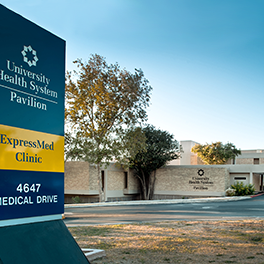University Health Pharmacies fulfills more than just your medications. We offer a variety of vaccines to help keep you and your family healthy.
Vaccine Offered by Pharmacy Location
Discharge Pharmacy
Walk-in Hours: Monday – Friday 8 a.m. – 5 p.m.
Patients Immunized: Teens and adults
- COVID-19 (12 years and older)
- Hepatitis A
- Hepatitis B
- Influenza (Flu)
- Measles, Mumps and Rubella (MMR)
- Pneumococcal
- Respiratory syncytial virus (RSV)
- Shingles
- Tetanus, Diphtheria and Pertussis (Tdap/Td)
Medical Center Pavilion Pharmacy
Walk-in Hours: Monday – Friday 8 a.m. – 5 p.m.
Patients Immunized: Children*, teens, and adults
*Child Vaccine Ages
*Some children may need a prescription for their vaccine or may need a person with extra injection training to administer. Please call 210-358-8680 to confirm availability.
Vaccines offered at this location:
- COVID-19
- Hepatitis B
- Hepatitis A & B combo
- Human Papillomavirus (HPV)
- Influenza (Flu)
- Measles, Mumps and Rubella (MMR)
- Meningococcal
- Pneumococcal
- Respiratory syncytial virus (RSV)
- Shingles
- Tetanus, Diphtheria and Pertussis (Tdap/Td)
Robert B. Green Campus Pharmacy
Walk-in Hours: Monday – Friday 8 a.m. – 5 p.m.
Patients Immunized: Children*, teens and adults
*Child Vaccine Ages
*Some children may need a prescription for their vaccine or may need a person with extra injection training to administer. Please call 210-358-8680 to confirm availability.
Vaccines offered at this location:
- COVID-19
- Haemophilus Influenza
- Hepatitis A
- Hepatitis B
- Hepatitis A & B combo
- Human Papillomavirus (HPV)
- Influenza (Flu)
- Measles, Mumps and Rubella (MMR)
- Meningococcal
- Pneumococcal
- Polio
- Respiratory syncytial virus (RSV)
- Shingles
- Tetanus, Diphtheria and Pertussis (Tdap/Td)
- Varicella
Southeast Pharmacy
Walk-in Hours: Monday – Friday 8 a.m. – 5 p.m.
Patients Immunized: Teens and adults
Vaccines offered at this location:
- COVID-19 (12 years and older)
- Haemophilus Influenza
- Hepatitis A
- Hepatitis B
- Hepatitis A & B combo
- Human Papillomavirus (HPV)
- Influenza (Flu)
- Measles, Mumps and Rubella (MMR)
- Meningococcal
- Pneumococcal
- Respiratory syncytial virus (RSV)
- Shingles
- Tetanus, Diphtheria and Pertussis (Tdap/Td)
Southwest Pharmacy
Walk-in Hours: Monday – Friday 8 a.m. – 5 p.m.
Patients Immunized: Teens and adults
Vaccines offered at this location:
- COVID-19 (12 years and older)
- Hepatitis B
- Human Papillomavirus (HPV)
- Influenza (Flu)
- Measles, Mumps and Rubella (MMR)
- Meningococcal
- Pneumococcal
- Respiratory syncytial virus (RSV)
- Shingles
- Tetanus, Diphtheria and Pertussis (Tdap/Td)
Texas Diabetes Institute Pharmacy
Walk-in Hours: Monday – Friday 8 a.m. – 5 p.m.
Patients Immunized: Teens and adults
Vaccines offered at this location:
- COVID-19 (12 years and older)
- Hepatitis B
- Influenza (Flu)
- Measles, Mumps and Rubella (MMR)
- Pneumococcal
- Respiratory syncytial virus (RSV)
- Shingles
- Tetanus, Diphtheria and Pertussis (Tdap/Td)
Vida Pharmacy
Walk-in Hours: Monday – Friday 8 a.m. – 5 p.m.
Patients immunized: Teens and adults
Vaccines offered at this location:
- COVID-19 (12 years and older)
- Hepatitis B
- Human papilloma virus (HPV)
- Influenza (Flu)
- Measles, Mumps and Rubella (MMR)
- Meningococcal (MCV4)
- Pneumococcal
- Respiratory syncytial virus (RSV)
- Shingles
- Tetanus, Diphtheria and Pertussis (Tdap/Td)
Wheatley Pharmacy
Walk-in Hours: Monday – Friday 8 a.m. – 5 p.m.
Patients Immunized: Teens and adults
Vaccines offered at this location:
- COVID-19 (12 years and older)
- Hepatitis B
- Influenza (Flu)
- Measles, Mumps and Rubella (MMR)
- Pneumococcal
- Respiratory syncytial virus (RSV)
- Shingles
- Tetanus, Diphtheria and Pertussis (Tdap/Td)
Access Your Immunization Records
As a University Health patient, you have access to view and print your vaccine records through MyChart.
To do so, sign in to your account and tap the menu button in the top left corner. Then choose "Health Summary" and select "Immunizations."
Your vaccine record will appear and you'll see an option to print it.
Vaccines We Offer
COVID-19
What is COVID-19?
COVID-19 (coronavirus disease 2019) is a disease caused by a virus named SARS-CoV-2. It can be very contagious and spreads quickly.
For more information about COVID-19, visit the CDC website.
Who should get the COVID-19 vaccine?
- 6 months and older
Where can I get vaccinated?
Available vaccinations vary by location. View our list of vaccines by location.
Haemophilus Influenzae Type B (Hib)
What is Hib?
Haemophilus Influenzae type b (Hib) is a type of bacteria that can cause severe infections, primarily in children younger than 5 years old.
For more information about HPV, visit the CDC website.
Who should get the Hib vaccine?
- Children younger than 5 years old
Where can I get vaccinated?
Available vaccinations vary by location. View our list of vaccines by location.
Hepatitis A (HAV)
What is Hep A?
Hepatitis A is a highly contagious liver infection caused by the hepatitis A virus (HAV). It is usually spread through close, personal contact with an infected person or when a person unknowingly ingests the virus from objects, food, or drinks that are contaminated by small amounts of stool (poop) from an infected person.
For more information about Hep A, visit the CDC website.
Who should get the Hepatitis A vaccine?
- 6 months and older
Where can I get vaccinated?
Available vaccinations vary by location. View our list of vaccines by location.
Hepatitis A & B Vaccine Combo
What is the Hepatitis A & B vaccine combo?
This contains both hepatitis A and hepatitis B vaccines to prevent these two forms of hepatitis.
Who should get the Hepatitis A & B vaccine combo?
- People ages 18 and older
- Recommended for individuals at an increased risk of getting hepatitis A and B infections
Where can I get vaccinated?
Available vaccinations vary by location. View our list of vaccines by location.
Hepatitis B (HBV)
What is Hep B?
Hepatitis B is a serious liver infection caused by the hepatitis B virus (HBV). It is usually spread through close contact with an infected person’s blood, open sores, or body fluids.
For more information about Hep B, visit the CDC website.
Who should get the Hepatitis B vaccine?
- All ages are eligible to get the Hep B vaccine
Where can I get vaccinated?
Available vaccinations vary by location. View our list of vaccines by location.
Human Papillomavirus (HPV)
What is HPV?
Human papillomavirus is a common virus spread through skin-to-skin contact and can cause cancers later in life.
For more information about HPV, visit the CDC website.
Who should get the HPV vaccine?
- People ages 9 and older
- The HPV vaccine is part of the vaccination schedule for children 11- to 12-years-old. The goal is to vaccinate children before they become sexually active and risk exposure.
- The vaccine is also recommended for people who started the series as a child, teen or young adult but didn’t finish it.
Where can I get vaccinated?
Available vaccinations vary by location. View our list of vaccines by location.
Influenza (Flu)
What is the flu?
Influenza (flu) is a contagious respiratory illness caused by influenza viruses that infect the nose, throat, and lungs.
For more information about influenza, visit the CDC website.
Who should get the flu vaccine?
- Anyone 6 months or older
- Our pharmacies offer the specially formulated senior flu vaccine for people aged 65 and older
Where can I get vaccinated?
Available vaccinations vary by location. View our list of vaccines by location.
Measles, Mumps and Rubella (MMR)
What is MMR?
The MMR vaccine prevents measles, mumps and rubella.
- Measles (M) causes fever, cough, runny nose, and red, watery eyes, commonly followed by a rash that covers the whole body.
- Mumps (M) causes fever, headache, muscle aches, tiredness, loss of appetite, and swollen and tender salivary glands under the ears. It can lead to other serious health issues.
- Rubella (R) causes fever, sore throat, rash, headache, and eye irritation. It can cause arthritis in up to half of teenage and adult women.
For more information about MMR, visit the CDC website.
Who should get the MMR vaccine?
- Children 12 months and older
- Adults who are unsure if they have immunity
- Adults who are in environments with high-risk MMR transmission: health care workers, college students and international travelers
Where can I get vaccinated?
Available vaccinations vary by location. View our list of vaccines by location.
Meningococcal
What is meningococcal?
Meningococcal disease is an uncommon but serious illness that causes meningitis and bloodstream infections.
Find more information meningococcal, visit the CDC website.
Who should get the meningococcal vaccine?
- People 11 to 12 years old
- A booster is recommended at 16 years old
Where can I get vaccinated?
Available vaccinations vary by location. View our list of vaccines by location.
Pneumococcal
What is pneumococcal?
Pneumococcal disease is a bacterial infection that can cause serious illness like meningitis, pneumonia and blood infections.
For more information about pneumococcal, visit the CDC website.
Who should get the pneumococcal vaccine?
- Adults 65 and older with chronic medical conditions and/or smokers
Where can I get vaccinated?
Available vaccinations vary by location. View our list of vaccines by location.
Polio
What is polio?
The polio vaccine prevents serious infection, such as paralysis or meningitis, caused by poliovirus. Polio disease has been eliminated in the United States thanks to vaccination. Getting vaccinated prevents the virus from coming back and helps to keep everyone safe.
For more information about polio, visit the CDC website [Polio Vaccination | Polio | CDC].
Who should get the polio vaccine?
- Children 2 months and older
- Adults who have never been vaccinated
Where can I get vaccinated?
Available vaccinations vary by location. View our list of vaccines by location.
Respiratory Syncytial Virus (RSV)
What is RSV?
Respiratory syncytial virus (RSV) is a common respiratory virus that infects the lungs but can also affect the nose and throat. RSV spreads in the fall and winter along with other respiratory viruses, like flu and COVID-19.
For more information about RSV, visit the CDC website.
Who should get the RSV vaccine?
- Adults 60 years and older who are at high risk of developing serve RSV
Where can I get vaccinated?
Available vaccinations vary by location. View our list of vaccines by location.
Shingles
What is shingles?
Shingles is a painful rash illness caused by the varicella-zoster virus (VSV) – the same virus that causes chickenpox.
For more information about shingles, visit the CDC website.
Who should get the shingles vaccine?
- Adults 50 years and older are encouraged to get this vaccine to prevent shingles and its complications.
Where can I get vaccinated?
Available vaccinations vary by location. View our list of vaccines by location.
Tetanus, Diphtheria and Pertussis (Tdap/Td)
What are tetanus, diphtheria and pertussis?
The Tdap vaccine prevents tetanus, diphtheria and pertussis.
- Tetanus (T) causes painful stiffening of the muscles. Tetanus can lead to serious health problems, including being unable to open the mouth, having trouble swallowing and breathing.
- Diphtheria (D) can lead to difficulty breathing, heart failure or paralysis.
- Pertussis (aP), also known as “whooping cough,” can cause uncontrollable, violent coughing that makes it hard to breathe, eat, or drink. Pertussis can be extremely serious in babies, children, teens and adults.
For more information about Tdap, visit the CDC website.
Who should get the Tdap/Td vaccine?
- Children 7 years and older
- Adults who did not receive it as children should get a Tdap/Td vaccine
- Adults should receive a Tdap/Td booster every 10 years
Where can I get vaccinated?
Available vaccinations vary by location. View our list of vaccines by location.



